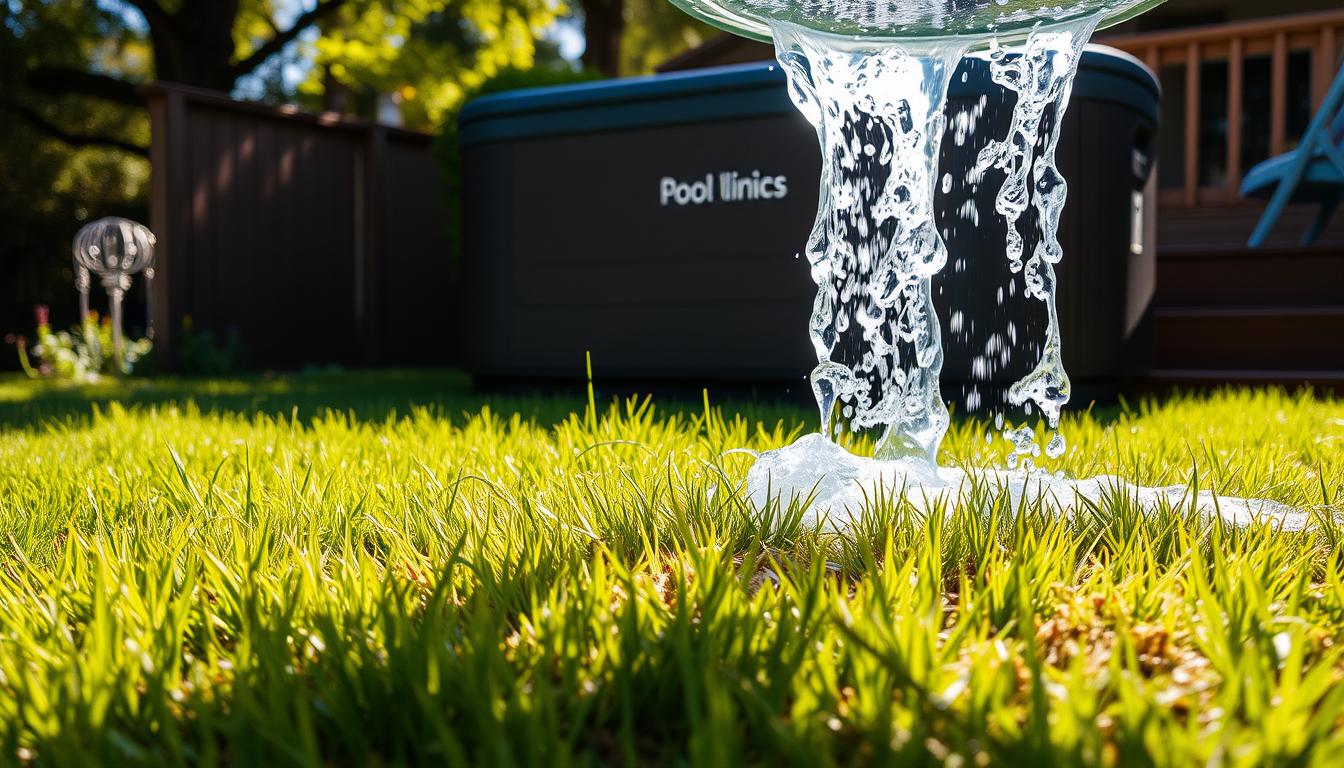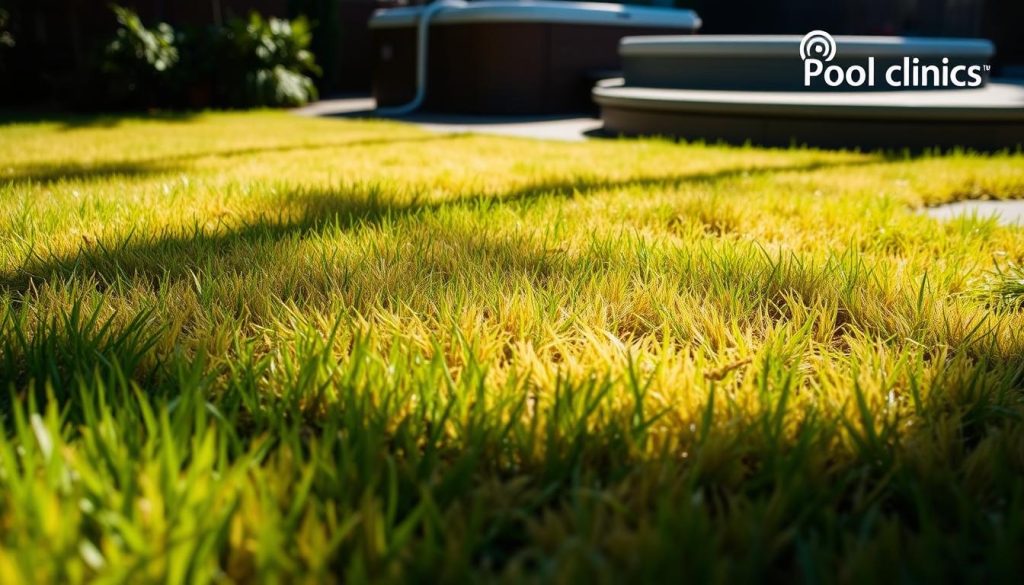
Summer’s here, and it’s time to enjoy your hot tub. But what about draining the water? You might worry about its effect on your lawn. Let’s explore how hot tub drainage impacts grass and share tips for lawn care.
You’ve just finished a relaxing soak in your hot tub. Now it’s time for maintenance and draining the water. You wonder if the chlorinated water could harm your green grass. It’s a common concern for hot tub owners.
The impact of hot tub water on grass varies. It depends on chemical concentrations, water volume, and drainage frequency. Taking the right steps can help protect your lawn.
Proper hot tub placement and water management are key. These practices can keep your grass healthy and vibrant. Follow best practices to minimize the risk of lawn damage.
Key Takeaways
- Draining hot tub water onto grass can potentially cause damage if not done properly
- The impact of hot tub water on grass depends on chemical concentrations, drainage amount, and frequency
- Proper hot tub placement and water management can minimize the risk of grass damage
- It’s important to check local regulations regarding water discharge before draining your hot tub
- Regular maintenance, such as cleaning pipes and testing water chemistry, can help prevent harm to your lawn
The Effects of Chlorine and Salt on Your Lawn
Pool water can harm your lawn. Chlorine and salt keep pools clean but may damage grass. Let’s explore how these chemicals affect your lawn and ways to protect it.

How Chlorine Can Harm Your Grass
High chlorine levels can hurt your lawn. It can cause chemical burns, creating brown patches and harming grass health. Chlorinated water can also disrupt soil pH, making it hard for grass to grow.
Chlorine damage depends on several factors. These include chlorine concentration, exposure time, grass type, and soil composition.
- The concentration of chlorine in the pool water
- The frequency and duration of exposure to chlorinated water
- The type of grass and its sensitivity to chlorine
- The soil composition and its ability to buffer the effects of chlorine
The Impact of Saltwater Pools on Your Lawn
Saltwater pools can also harm your lawn. They increase soil salinity, making it tough for plants to thrive. High salt levels can lead to soil compaction, especially in clay-rich soil.
Compacted soil limits nutrient and water absorption. This can stunt grass growth and potentially kill it. The impact varies based on several factors.
- The salt concentration in the pool water
- The frequency and duration of exposure to saltwater
- The soil composition and its ability to drain excess salt
- The grass species and its tolerance to salt
| Pool Type | Potential Lawn Damage | Factors Affecting Severity |
|---|---|---|
| Chlorine Pools | Chemical burns, pH imbalance, grass death | Chlorine concentration, exposure frequency, grass sensitivity, soil composition |
| Saltwater Pools | Soil compaction, nutrient absorption issues, grass death | Salt concentration, exposure frequency, soil drainage, grass salt tolerance |
Protect your lawn by maintaining proper pool chemical levels. Avoid using pool water for irrigation. Prevent pool water from reaching your grass. We’ll discuss these preventive measures in the following sections.
Preventing Pool Water from Harming Your Grass
Pool owners want to enjoy their backyard oasis without damaging their lawn. We can protect our grass from harmful pool chemicals with simple precautions. Proper pool maintenance techniques help keep our lawn lush and green.
Avoid Irrigating with Pool Water
Don’t use pool water for lawn irrigation, even during dry spells. Pool water contains chemicals that can harm your grass, causing discoloration and stunted growth. Use fresh water from your garden hose or irrigation system instead.
Maintain Proper Pool Chemical Levels
Regular pool maintenance prevents grass damage. Test and adjust chemical levels 2-3 times weekly to keep water balanced. Keep chlorine between 1-3 ppm and pH between 7.2-7.6 to minimize chemical burn risk.
| Pool Chemical | Ideal Range | Testing Frequency |
|---|---|---|
| Chlorine | 1-3 ppm | 2-3 times per week |
| pH | 7.2-7.6 | 2-3 times per week |
| Alkalinity | 80-120 ppm | 1-2 times per week |
| Calcium Hardness | 200-400 ppm | 1-2 times per month |
Drain Your Pool Responsibly
When draining your pool, connect the outlet to a proper drainage system. This prevents killing your grass and follows local regulations. Use a submersible pump for efficiency, but avoid draining too much water at once.
Check your local rules before draining. In some areas, like Dallas, Texas, it’s illegal to drain into public storm drains.
Store Pool Gear Off the Lawn
Keep pool accessories and gear off the grass when not in use. Wet items can drip chemicals onto the soil, causing damage. Store these items in a deck box or shed to protect your lawn.
Will Hot Tub Water Kill Grass?
Hot tub water can impact your lawn’s health. The chemical makeup of this water may alter soil chemistry. This change can affect how well your grass grows.
Factors Affecting the Impact of Bromine on Grass
Bromine’s effect on grass isn’t always clear-cut. Too much bromine can upset the soil’s salt and mineral balance. This imbalance may lead to slow growth or odd coloring in grass.
Poor bromine management can make water more acidic. Watering with this acidic water can harm grass. Using untreated hot tub water on lawns can also hurt grass health.
Keep bromine levels between 3.0 to 5.0mg/l in hot tubs. Use granules or tablets for effective cleaning.
Grass Type and Soil Composition
Different grass types react differently to soil changes. Warm-season grasses like Zoysia are more sensitive than cool-season types. Soil type also matters in how bromine affects your lawn.
Sandy soils let chemicals spread more easily. Clay soils help limit chemical spread. Test your soil often to catch any imbalances early.
The Importance of Dilution
Diluting hot tub water can help protect your grass. Mix one part hot tub water with ten parts fresh water before use. This method reduces the concentration of bromine and other chemicals.
Adjust the pH of hot tub water before disposal. Aim for a pH between 7.2 and 7.6. This range prevents equipment damage and keeps bathers comfortable.
| Water Quality Parameter | Recommended Range |
|---|---|
| pH Level | 7.2 – 7.6 |
| Bromine Concentration | 3.0 – 5.0 mg/l |
| Total Alkalinity | 80 – 150 mg/l |
| Calcium Hardness | 100 – 200 mg/l |
Understanding how hot tub water affects grass helps maintain a healthy lawn. Consider bromine levels, grass types, and soil chemistry. Proper dilution is key to protecting your grass while enjoying your hot tub.
Conclusion
Hot tub water can harm your lawn, but there are ways to reduce its impact. Neutralize the pH level before draining and dilute the water if using it on grass. Regular soil testing helps identify imbalances caused by hot tub water.
Implement a comprehensive grass maintenance routine for a lush, green lawn. Use proper watering techniques to provide the right amount of moisture. Avoid overwatering, which can lead to shallow root growth.
Regular mowing at the right height encourages dense growth and prevents weeds. Apply a balanced fertilization program tailored to your lawn’s needs. This provides necessary nutrients for optimal growth and resilience.
Combine responsible hot tub water disposal with dedicated lawn care for a thriving lawn. Focus on watering, mowing, fertilization, and soil health. You can enjoy your hot tub without compromising your grass’s beauty and vitality.







